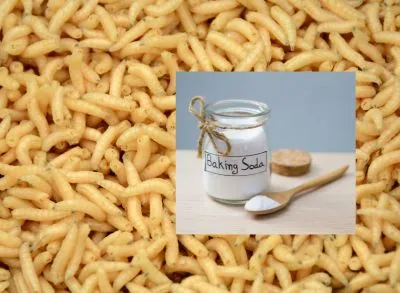- 5 Simple Tricks to Eliminate Maggots From Pet Waste - October 24, 2023
- Keep Your Outdoor Compost Piles Maggot-Free - October 24, 2023
- How to Get Rid of Maggots – Methods that Work - August 30, 2023
Baking soda is renowned for its diverse uses, including pest control, but does it kill maggots? Yes! Maggots breathe through their body’s tiny holes. Baking soda’s abrasiveness blocks these openings, causing the maggots to suffocate. Applying a mix of baking soda and water on them will cause them to die off.
Yet, it’s essential to remember that baking soda may not be the ideal solution for severe infestations. It’s wise to get professional help in such cases. Additionally, prevention is better than cure. Keeping your environment clean and properly disposing of organic waste will prevent flies from appearing and maggots from forming.
To learn if baking soda can kill maggots, you need to know how it works, so let’s dive into the topic a bit more.
What is Baking Soda?
Baking soda, known as sodium bicarbonate, is a white powder often used in cooking and baking. It has a salty taste and can help bread doughs rise. Baking soda can also be used to clean things due to its abrasiveness.
Mixing it with an acid, like vinegar or lemon juice, produces carbon dioxide gas. This makes the mixture fizz and bubble. It can come in handy to get rid of stains or odors.
So, can it kill maggots? It has a dehydrating effect that may do the trick. But, there are better methods: removing their food source and using insecticides.

How does Baking Soda work on Maggots?
Baking soda is a common household item. It’s used to get rid of maggots. So, how does it work? Here’s the process:
- Generously spread baking soda over the maggot-infested area.
- Spray water on top until it forms a paste.
- Cover the area with plastic wrap. This traps the gas released from the baking soda and moisture.
- After 6-8 hours, take off the plastic wrap and clean up the residue.
Baking soda works because it increases pH levels beyond what maggots can tolerate. Use this method as a last resort or if all else fails, since it involves chemicals.
Other Ways to Kill Maggots
To kill maggots without the use of chemical insecticides, you can turn to a few simple household items.
Boiling Water
Locate the maggot infested area. Boil a pot or kettle of water. Carefully pour the boiling water over the maggot affected area. Let it sit for 10-15 minutes. Dispose of dead maggots and clean it up.
Freezing temperatures can also be used! Put infested items in the freezer for several days.
It’s important to know that these methods won’t work for all environments. Get professional advice before attempting to eradicate those maggots!
Boiling water has been used as a pest control method for centuries and is a great way to get rid of unwanted insects like maggots!
Salt
The desiccating power of salt is a great way to get rid of larvae. It absorbs moisture quickly, making the air around the larvae dry. This causes their outer layer to become hardened, preventing oxygen exchange. To kill maggots, just sprinkle salt over the affected area.
But, it’s important to know how much salt to use. Too much can corrode surfaces or cause unwanted chemical reactions. Plus, it may draw in rodents if left uneaten.
Vinegar
Vinegar, aka acetic acid solution, is great for killing maggots. Here’s why:
- Acetic acid creates an acidic environment that maggots don’t survive in.
- White vinegar is the most powerful, as it has the highest concentration of acid.
- You must apply the vinegar directly to the maggots. Pouring it into a bin won’t work.
Vinegar won’t always work – blowfly larvae can tolerate more acidity.
If needed, try boiling water or boric acid powder. Boiling water will scald maggots, while boric acid dehydrates them and kills them gradually.
In short, vinegar is an effective maggot killer, but other methods might be needed for stubborn infestations.
Essential Oils
Plant extracts, otherwise known as Essential Oils, can be used to fight maggots. Here are five ways to make use of them:
- Peppermint Oil – Its strong and fresh smell can help ward off maggots.
- Lavender Oil – Lavender oil is known for its insecticidal properties. It can kill maggots.
- Eucalyptus Oil – Like lavender oil, eucalyptus oil can repel the flies that lay eggs on waste materials.
- Cedarwood Oil – Maggots, as well as other pests such as mosquitoes, fleas, and ticks, find the odor of cedarwood repulsive.
- Rosemary Oil – Rosemary oil has antiseptic qualities and can be used in a hot water mixture to kill maggots inside drains or garbage containers.
Essential oils may lose their potency over time. So, frequent application may be needed. To get rid of maggot infestations completely, it’s important to combine essential oils with other preventive measures. Such as keeping your garbage containers closed and storing food properly.
If you’re looking for more options to control maggots, keep reading.
Preventing Maggots Infestation
To prevent maggots infestation in your home, cleanliness and sanitation, proper disposal of waste, and sealing cracks and holes are the key.
Cleanliness and Sanitation
Cleanliness and hygiene are vital for avoiding maggot infestations. Adequate waste disposal, storing food well and regular cleaning can help keep a safe and clean environment. Here are some tips:
- Dispose of waste, esp. food waste, quickly.
- Store food in airtight containers or cling film.
- Clean cooking utensils after use.
- Thoroughly clean all surfaces that come into contact with food.
- Use the right detergents for washing clothes, bedding, and furniture.
- Keep your pets clean and parasite-free.
It’s also vital to keep drains clean. These can accumulate hair and debris, which may attract flies that lay eggs and become maggots.
Plus, make sure there’s no standing water near your residence or workplace. This can be a breeding ground for flies and other pests.
In WWI, soldiers were often affected by maggot infestations because of the conditions. Those who got medical attention soon had fewer issues. Nowadays, we have better ways to stop such infestations – just keep clean and practice good hygiene constantly.
Proper Disposal of Waste
The management of rubbish is essential to stop maggots from spreading. To comply with sanitation standards, garbage disposal needs to follow municipal regulations.
Using trash cans with firmly closed lids and disposing of waste regularly is key for proper garbage handling. Cleaning around the bins will also help keep insects away.
Food and organic waste should not be left in easily accessible places, especially in the summer when temperatures are high. Maggots grow faster in warm environments.
An example of this is a restaurant that had an infestation of maggots due to improperly disposing of seafood scraps. This could have been avoided if they followed the right waste removal processes consistently.
Conclusion
Baking soda is a good way to kill maggots. It messes with their internal pH balance, causing them to die. But it may not get rid of the infestation completely. You must get rid of what attracts them and clean the area. Combining baking soda and vinegar makes for a powerful solution that works even better. The University of California Agriculture and Natural Resources Department did a study showing that vinegar and baking soda mixtures can help control fly larvae.
Hopefully these tips will help you solve your maggot problem. Don’t forget to check out the rest of my website – DeadPestz
